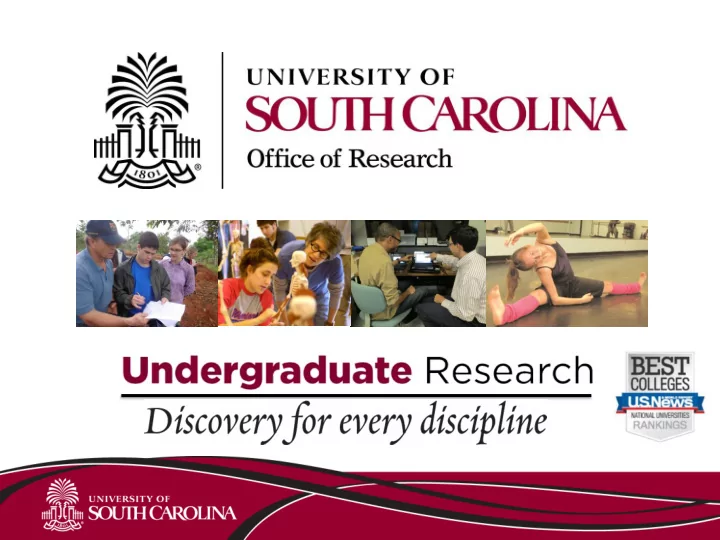

Undergraduate Research • Education and outreach • Matchmaking • Funding • Showcasing
TRIO and McNair Scholars • Early and regular advising touch points • Targeted presentations • Matchmakers • Special grant program – Early experiences – Extended research for McNair Scholars
SC Alliance for Minority Participation • Network of 9 4-year and 5 technical institutions • Goal of increasing STEM graduate education • Summer research experiences
Summer Community of Scholars • Common experiences for students in summer research and resources for faculty • Benefits: – Diversity – Outreach – Funding
Summer Community of Scholars • For students: – Professional development workshops: ethics, grad school, communication, presentations – Summer symposium • For faculty: – Administrative support – Support for Minority Advancement in Research Training Program (SMART)
Magellan Programs • Since 2005, 9 programs (8 funding) – Scholar, Minigrant, Guarantee, Apprentice, Explorer, Voyager, Navigator, Sustainable, Ambassadors, stay tuned… • Scholar: – 1320 students – $3.4M – System-wide
Magellan Programs • Discovery for all – Engineering 14% – Science 37% – Social Science 33% – Humanities 10% – Arts 6% • Research Abroad 13% • Community component 15%
Magellan Impact • Alumni: 858 (72% response) – Advanced Education (403) 65% • Graduate School 52% • Medical School/Health 24% – Business/Industry/Government • Boeing, Google/IBM/Microsoft, BP/Exxon, CDC (5), Smithsonian (3) – National Awards • 151 awardees+39 Finalists/Honorable Mentions
Undergraduate Research Journal C ar aravel avel • On-line; all disciplines • Multi-media platform
• Undergraduate Showcase: – 70 in 2004 to 619 in 2016 • 2017 Inaugural Event: – 1055 (714 undergraduate) Research, creative activities, leadership, internships, global study, service, national fellowships …
Partnering for Success • Translatable, adaptable, sustainable – institutional type and campus climate • Utilize strengths to address challenges • Provide services and programs that promote success for under-represented minorities, first- generation college students, and early experiences
Partnering for Success • Strategic • Mutually beneficial • Shared goals and standards • Complementary expertise and separate roles • Leveraged the resources of all parties to more efficiently impact goals and outcomes (budgets, staff time, activities) • Expand the impact of limited resources
University of South Carolina Undergraduate Research April 4, 2017 Julie Morris; Director, Undergraduate Research jmorris@sc.edu * 803-777-4649 Finley, A., & McNair, T. (2013). Assessing underserved students’ engagement in high -impact practices. Washington. DC: Association of American Colleges and Universities. Kuh, G. D. (2008). High-Impact Educational Practices: What They Are, Who Has Access to Them, and Why They Matter. Association of American Colleges and Universities. Kuh , G. D., O’Donnell, K., & Reed, S. (2013). Ensuring quality and taking high -impact practices to scale. Washington, DC: Association of American Colleges and Universities. Nagda, B. A., Gregerman, S. R., Jonides, J., von Hippel, W., & Lerner, J. S. (1998). Undergraduate Student-Faculty Research Partnerships Affect Student Retention. Review of Higher Education, 22(1), 55-72.
Recommend
More recommend